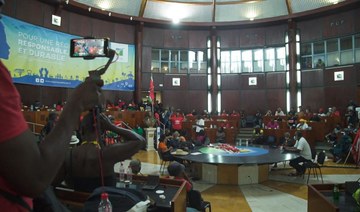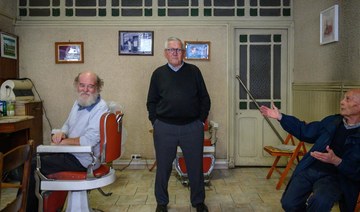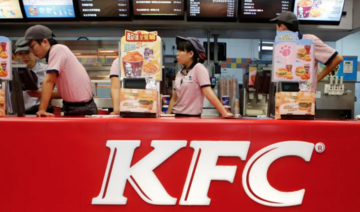MARLY-LE-ROI, France: No more munching, crunching and slurping at the movies in France.
The country’s increasingly fraught fight against an unprecedented surge in coronavirus infections is putting a stop to eating and drinking at French cinemas, just as they show signs of recovering from the brutal economic bashing of lockdowns last year.
COVID-19 measures kicking in Monday, once France’s New Year’s celebrations are out of the way, will mean an enforced rest for popcorn machines and ice creams left in cold storage. The ban of at least three weeks on eating and drinking also applies to theaters, sports venues and public transport.
For cinema owners hoping to lure back movie fans who switched to home-viewing during the pandemic, not being able to tempt them with candies and soft drinks is another blow. French cinemas sold 96 million tickets in the eight months they have been reopened this year, a jump of 47 percent compared to 2020. But ticket sales are still down 55 percent compared to 2019, before the pandemic, the National Center for Film and Moving Images said Thursday in its look at French cinemas’ annual sales.
Benoit Ciné Distribution, which supplies 70 percent of France’s cinemas with popcorn, sweet treats and drinks, was deluged with both order postponements and delivery requests from movie houses expecting good sales on the final weekend before the food and drink ban, with “Spider-Man: No Way Home” and “Matrix Resurrections” featuring on billboards.
“It’s like being told to apply the emergency brake to the high-speed train,” said Vincent Meyer, a director at Benoit.
Against raging coronavirus infections, the government is hoping its latest measures will also apply a brake on the fast-spreading omicron variant, but without derailing France’s economic recovery that is a vote-getter for President Emmanuel Macron, facing reelection in April.
As well as the food and drink ban, there’ll once again also be limits on crowd numbers at public venues, with no more than 2,000 allowed indoors and 5,000 outdoors. The limits don’t apply to election campaign rallies, infuriating some musicians who will no longer be allowed to perform for stand-up crowds. Some suggested, only half-jokingly, that they may rebrand their concerts as political rallies.
France’s COVID-19 death toll is already at more than 123,000 people. New infections are higher than they have ever been and hospitals are again overburdened with the gravely sick. Many health experts had called for stricter measures than those announced by the government this week, with some pushing for renewed closures of schools and businesses. France reported another 206,243 coronavirus infections Thursday, just shy of the record 208,000 cases set Wednesday.
Michel Enten, manager of the Le Fontenelle cinema in the town of Marly-le-Roi west of Paris, was relieved to stay open, even if he’ll no longer be able to sell cotton candy, popcorn, ices and drinks. He says he has lost about half of his clientele during the pandemic. He expects the ban on food and drinks to hit larger cinemas particularly hard and says it may even help lure back fans to smaller, arty cinemas like his.
“There are lots of people who hate hearing the sounds of popcorn in the auditoriums,” he said. “Perhaps we will win over new movie fans, people who were watching Netflix and are saying to themselves, ‘Now there’s no more popcorn, let’s run to the cinema.’“
Cinemagoers said they understood the need for new measures, although some struggled to see any logic in not being able to indulge their sweet cravings in cinemas or theaters when restaurants are still allowed to serve food and drinks.
“It’s going to be strange to just go to the cinema and do without all these little moments,” Vincent Bourdais said as he lined up in Marly-le-Roi for “Spiderman.”
“Often, when one imagines the cinema, one thinks of the auditorium, the beautiful posters, the popcorn, the smells.”
Cut! Popcorn, candy ban hits French cinemas’ virus recovery
https://arab.news/gfkvf
Cut! Popcorn, candy ban hits French cinemas’ virus recovery
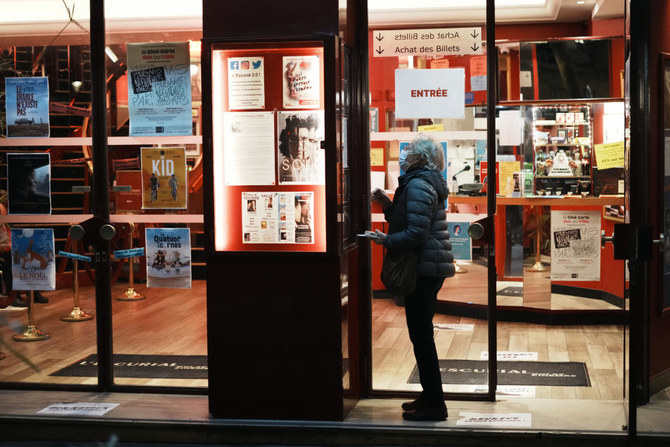
- COVID-19 measures kicking in Monday will mean an enforced rest for popcorn machines and ice creams
- The ban of at least 3 weeks on eating and drinking applies to theaters, sports venues and public transport
Palestinian prisoner in Israel wins top fiction prize

- The mask in the novel’s title refers to the blue identity card that Nur, an archaeologist living in a refugee camp in Ramallah, finds in the pocket of an old coat belonging to an Israeli
ABU DHABI: Palestinian writer Basim Khandaqji, jailed 20 years ago in Israel, won a prestigious prize for Arabic fiction on Sunday for his novel “A Mask, the Color of the Sky.”
The award of the 2024 International Prize for Arabic Fiction was announced at a ceremony in Abu Dhabi.
The prize was accepted on Khandaqji’s behalf by Rana Idriss, owner of Dar Al-Adab, the book’s Lebanon-based publisher.
Khandaqji was born in the Israeli-occupied West Bank city of Nablus in 1983, and wrote short stories until his arrest in 2004 at the age of 21.
He was convicted and jailed on charges relating to a deadly bombing in Tel Aviv, and completed his university education from inside jail via the Internet.
The mask in the novel’s title refers to the blue identity card that Nur, an archaeologist living in a refugee camp in Ramallah, finds in the pocket of an old coat belonging to an Israeli.
Khandaqji’s book was chosen from 133 works submitted to the competition.
Nabil Suleiman, who chaired the jury, said the novel “dissects a complex, bitter reality of family fragmentation, displacement, genocide, and racism.”
Since being jailed Khandaqji has written poetry collections including “Rituals of the First Time” and “The Breath of a Nocturnal Poem.”
He has also written three earlier novels.
Mexican doctor claims victory in $28 Cartier earrings battle

MEXICO CITY: A Mexican man has claimed a victory over French luxury brand Cartier, saying an error allowed him to buy two pairs of earrings for $28 that were supposed to cost nearly $28,000.
After a four-month struggle, doctor Rogelio Villarreal said he had finally received the jewelry, which he accused the company of refusing to deliver after his online purchase in December.
According to Villarreal, he came across the low-priced earrings while browsing Instagram.
“I swear I broke out in a cold sweat,” he wrote on the social media platform X.
Cartier declined to recognize the purchase and offered Villarreal a refund, as well as a bottle of champagne and a passport holder as compensation, according to a company letter shared by the doctor.
But Villarreal refused and decided to take the case to Mexico’s consumer protection agency, which ruled in favor of the doctor.
Cartier accepted the decision, Villarreal announced.
“War is over. Cartier is complying,” he wrote.
French barber still trimming at 90
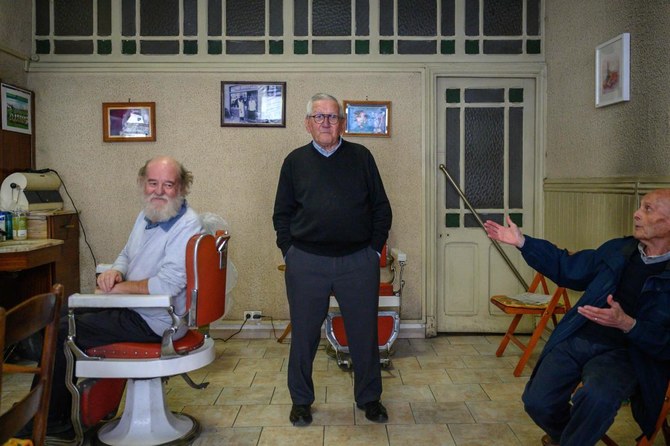
- “I love this job, it’s in my bones,” he said
- Even with arthritis, he is on his feet from Tuesday to Saturday, tending to his customers’ hair and beards in his shop in the small southern town of Saint-Girons
SAINT-GIRONS, France: French barber Roger Amilhastre, 90, could have hung up his clippers decades ago but he said his passion for hair gives him a reason to get up in the morning.
“I love this job, it’s in my bones,” he said, leaning on one of his cast-iron barber’s chairs from the 1940s.
“And despite my age, my hands still don’t shake.”
Even with arthritis, he is on his feet from Tuesday to Saturday, tending to his customers’ hair and beards in his shop in the small southern town of Saint-Girons in the foothills of the Pyrenees.
“I would have liked to retire at 60, but my wife was sick and I needed to pay for the care home,” he said, which cost more than 2,000 euros ($2,150) a month.
Even after his wife died in January, he kept going to work to stave off the sad thoughts.
“I’m not grumpy getting up” to go to work, he said.
France’s national hairdressers’ union believes Amilhastre may be France’s oldest active barber.
“We have a few who continue late in life, but 90 years old is exceptional,” union president Christophe Dore told AFP.
“I’m not sure if he is France’s oldest barber, but if not, he can’t be far off,” he added.
According to the national statistics institute INSEE, a little more than half a million people over 65 still work in France.
In the southern region of Occitanie, where Amilhastre lives, only 1.65 percent of people older than 70 years old still work, including 190 79-year-olds. But statistics do not go beyond that age.
Many of Amilhastre’s customers call him Achille, after his father who founded the barber’s shop in 1932, giving it his name and then teaching his son the profession.
The shop witnessed the German occupation of France during World War II.
“During the war, German police came to find my father to groom a captain who had broken his leg,” Amilhastre said.
German troops had taken over a large stately home in town called Beauregard.
“We were scared because they used to say that anyone who went up to Beauregard never came back,” he said.
“Luckily he did.”
The 90-year-old said he remembered a “tough period” for businesses when he first picked up the scissors in 1947 a few years after the war ended.
But then the town rebounded, he said, with its men following a flurry of new hair trends from greased back quiffs in the 1950s to 1970s bowl cuts.
The barber’s shop survived an economic downturn as local paper mills closed in the 1980s sparking mass layoffs, and supermarkets pushed small shops out of business.
“People started looking for work further afield, so we had to adapt and stay open later in the evening,” Amilhastre said.
That same decade, the AIDS epidemic sent customers into a worried frenzy.
“People were scared. They no longer asked to be shaved and when we did, we were petrified there’d be a cut, that someone would bleed and the virus would be passed on to the next customer,” he said.
Jean-Louis Surre, 67, runs the nearby cafe where Amilhastre once taught him to play billiards as a young boy.
Behind his bar, Surre said he still remembered his mother taking him across the road to see Amilhastre for a haircut every month as a child.
“He’d pump up the chair to reach the mirror, use his clippers and then at the end perfume you with some cologne — you know, squeezing those little pumps,” he said.
He is one of several old-timers to regularly drop by Achille’s — even just to read the newspaper or have a chat.
Inside the barber’s, Jean Laffitte, a balding 84-year-old, said he no longer really needed a haircut.
“With what little is left up there, these days I come out of friendship,” he said.
China’s Shenzhou-18 mission docks with space station

- The astronauts took off from the Jiuquan Satellite Launch Center in China’s northwest at 8:59 p.m. local time Thursday
- The astronauts will stay at the Tiangong space station for six months, carrying out experiments
JIUQUAN, China: A spaceship carrying three astronauts from China’s Shenzhou-18 mission safely docked at Tiangong space station Friday, state-run media reported, the latest step in Beijing’s space program that aims to send astronauts to the Moon by 2030.
The crew took off in a capsule atop a Long March-2F rocket from the Jiuquan Satellite Launch Center in China’s northwest at 8:59 p.m. local time 1259 GMT) Thursday.
By early Friday the spacecraft had “successfully docked” with the space station, state-run news agency Xinhua reported, citing the China Manned Space Agency.
The mission is led by Ye Guangfu, a fighter pilot and astronaut who was previously part of the Shenzhou-13 crew in 2021.
He is joined by astronauts Li Cong and Li Guangsu, who are heading into space for the first time.

Onlookers cheered as the rocket blasted off into the night sky, an AFP journalist at the scene said.
Xinhua said the launch had been declared a “complete success.”
The astronauts will stay at the Tiangong space station for six months.
There they plan to carry out experiments “in the fields of basic physics in microgravity, space material science, space life science, space medicine and space technology,” the China Manned Space Agency has said.
They will also try and create an aquarium onboard and seek to raise fish in zero gravity, according to Xinhua.
“Not only will the taikonauts find joy in the space ‘aquarium,’ but it may also pave the way for their future counterparts to enjoy nutritious fish from their own in-orbit harvests,” it added.

They will also conduct experiments on “fruit flies and mice,” a researcher quoted by the agency said.
The new crew will replace the Shenzhou-17 team, who were sent to the station in October.
Plans for China’s “space dream” have been put into overdrive under President Xi Jinping.
The world’s second-largest economy has pumped billions of dollars into its military-run space program in an effort to catch up with the United States and Russia.
Beijing also aims to send a crewed mission to the Moon by 2030, and plans to build a base on the lunar surface.
China has been effectively excluded from the International Space Station since 2011, when the United States banned NASA from engaging with the country — pushing Beijing to develop its own orbital outpost.
That station is the Tiangong, which means “heavenly palace” — the crown jewel of a space program that has landed robotic rovers on Mars and the Moon, and made China the third country to independently put humans in orbit.
It is constantly crewed by rotating teams of three astronauts, with construction completed in 2022.
The Tiangong is expected to remain in low Earth orbit at between 400 and 450 kilometers (250 and 280 miles) above the planet for at least 10 years.
Algeria’s first KFC restaurant reopens without logo following Gaza protests
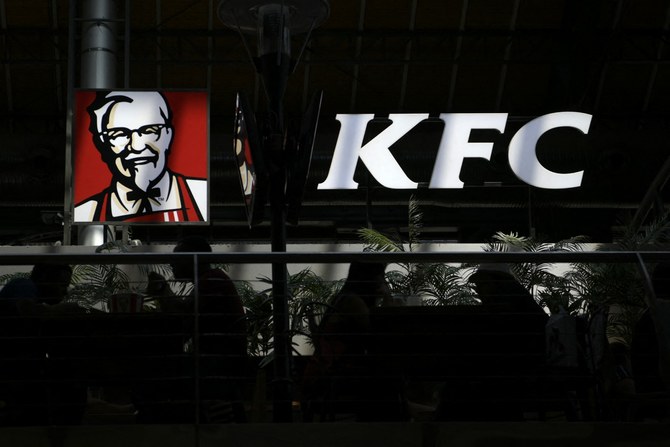
- Protesters gathered outside outlet last week in solidarity with Palestinians
- KFC parent company Yum! Brands has faced backlash for its ties with Israel
LONDON: Algeria’s first Kentucky Fried Chicken outlet has resumed operations after a temporary closure prompted by a series of pro-Palestinian demonstrations last week.
However, the restaurant, situated in the Algiers suburb of Dely Ibrahim, reopened its doors without the familiar Col. Sanders logo on its exterior.
It remains unclear if the outlet has had a change of ownership or remains under the umbrella of Yum! Brands, the parent company of KFC.
Demonstrators gathered outside the eatery on April 16, calling for a boycott and expressing solidarity with Palestinians amid the Gaza conflict.
Protesters draped in Palestinian flags voiced support for “Palestinian martyrs” while obstructing access to the storefront.
The restaurant has faced a backlash due to its perceived ties to Israel, with Yum! Brands having made investments in Israeli startups, including TicTuk, a company that allows customers to order food on social networks and message apps, and Dragontail, a system software company specializing in food processing.
In response, the Boycott, Divestment, Sanctions movement designated KFC’s sister company, Pizza Hut, as an “organic boycott target,” due to the “brands’ complicity in Israel’s genocide and apartheid against Palestinians.”
بعد أيام من افتتاح فرعها الأول، KFC الجزائر تزيل شعار علامتها وتُغلق أبوابها!
— أحمد داود (@AhmadDaoud14) April 17, 2024
منذ افتتاحها تعالت أصوات مقاطعتها، ووقفات احتجاجية أمامها، واستنكارٌ لمنح الترخيص لوكيلها! #الجزائر
pic.twitter.com/rIaOG80xTi
While the temporary closure of the KFC outlet was hailed as a success by demonstrators, its reopening sparked disappointment among some Algerians.
The incident underscores challenges and employment ramifications stemming from boycotts related to the Gaza conflict.
Since the start of the war, regional franchises of McDonald’s, one of the key boycotted brands, have distanced themselves from the parent company, arguing that they are 100 percent local.
The opening of a KFC branch in Algeria was noteworthy given the nation’s historical aversion to Western food chains, as well as its stringent foreign investment regulations, which typically prohibit the establishment of foreign food or beverage franchises.
Previous efforts to establish outlets without official approval, such as the brief appearance of a counterfeit “Starbucks,” have been met with swift action and closure.



